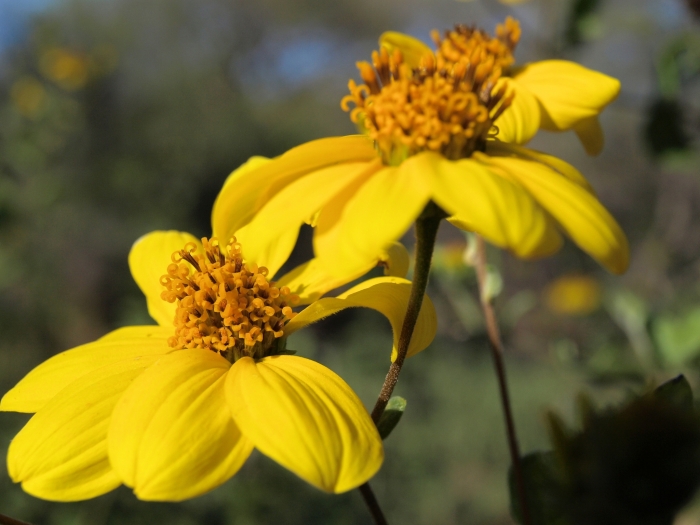Parish Goldeneye
(Bahiopsis deltoidea)
Parish Goldeneye (Bahiopsis deltoidea)
/
/

Jim Morefield
CC BY 4.0
Image By:
Jim Morefield
Recorded By:
Copyright:
CC BY 4.0
Copyright Notice:
Photo by: Jim Morefield | License Type: CC BY 4.0 | License URL: http://creativecommons.org/licenses/by/4.0/ | Rights Holder: Jim Morefield | Publisher: iNaturalist | Date Created: 2020-01-26T16:00:01-08:00 |



















Estimated Native Range
Summary
Bahiopsis deltoidea, commonly known as Parish Goldeneye, is a semi-deciduous subshrub native to the arid desert scrub and rocky slopes in the Southwestern USA and Northwestern Mexico. It typically grows to a height of 2-3 feet (0.6-0.9 meters) and a width of 1-2 feet (0.3-0.6 meters). The plant has a compact form with deltoid to ovate leaves and produces bright yellow, daisy-like flowers that bloom profusely in the spring, with sporadic flowering continuing through summer and fall. The flowers are highly attractive to pollinators, particularly butterflies.
Parish Goldeneye is valued for its drought tolerance and ability to thrive in harsh, dry conditions, making it an excellent choice for xeriscaping and water-wise gardens. It is often used in rock gardens, as a border plant, or in naturalized desert landscapes. This subshrub requires minimal maintenance and is well-suited to full sun exposure, requiring very low amounts of water once established. It prefers well-draining soils and is tolerant of poor, rocky substrates. While generally disease-free, it can be susceptible to root rot if overwatered. Parish Goldeneye is not known for aggressive roots or significant disease problems, making it a low-risk addition to the garden.CC BY-SA 4.0
Parish Goldeneye is valued for its drought tolerance and ability to thrive in harsh, dry conditions, making it an excellent choice for xeriscaping and water-wise gardens. It is often used in rock gardens, as a border plant, or in naturalized desert landscapes. This subshrub requires minimal maintenance and is well-suited to full sun exposure, requiring very low amounts of water once established. It prefers well-draining soils and is tolerant of poor, rocky substrates. While generally disease-free, it can be susceptible to root rot if overwatered. Parish Goldeneye is not known for aggressive roots or significant disease problems, making it a low-risk addition to the garden.CC BY-SA 4.0
Plant Description
- Plant Type: Subshrub
- Height: 2-3 feet
- Width: 1-2 feet
- Growth Rate: Moderate
- Flower Color: Yellow
- Flowering Season: Spring, Summer, Fall
- Leaf Retention: Semi-Deciduous
Growth Requirements
- Sun: Full Sun
- Water: Very Low
- Drainage: Fast
Common Uses
Bee Garden, Bird Garden, Border Plant, Butterfly Garden, Low Maintenance
Natural Habitat
Arid desert scrub and rocky slopes in the Southwestern USA and Northwestern Mexico
Other Names
Common Names: Shrubby Goldeneye, Parish’s Goldeneye
Scientific Names: , Viguiera deltoidea, Bahiopsis deltoidea, Viguiera deltoidea var. genuina,
GBIF Accepted Name: Bahiopsis deltoidea (A.Gray) E.E.Schill. & Panero